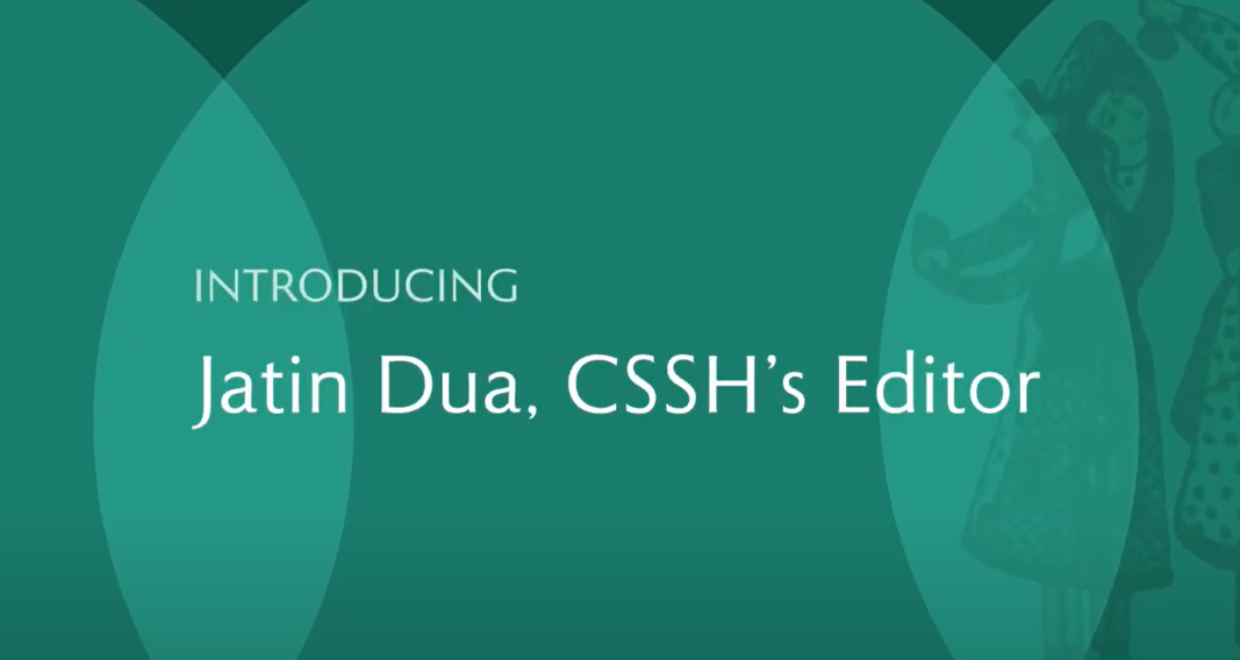Interview with the editor of Comparative Studies in Society and History
Please introduce yourself.
I’m Jatin Dua, an associate professor of anthropology at the University of Michigan and the incoming editor of Comparative Studies in Society and History. I’m a historical anthropologist whose work is focused primarily on maritime mobility and its interruption in the Indian Ocean and other oceanic spaces – my first book was on maritime piracy in the Western Indian Ocean, locating it within broader histories and geographies of protection on land and at sea.
I’m currently working on a book that explores various kinds of lines at sea, from shipping lines to maritime borders, exclusive economic zones, and trade wars, and asks bigger questions about how lines at sea end up shaping the world that we live in.
What is your history with CSSH?
I’m a CSSH author and published a piece in 2019 that was awarded the 2020 Jack Goody Award by the journal. I have been on the editorial committee since 2020 and came in as the incoming editor from June 2024.
What do you think are the challenges in the field today?
I think academic publishing in an interesting stage – there used to be a certain model of how academic publishing worked and now that system doesn’t exist. We’ve already moved from physical issues that appeared regularly in a bound format throughout the year to virtual issues. With FirstView articles appear before they are assigned to issues so we tend to think of articles as opposed to whole issues.
There’s been conversations around what the journal format is, what its political economy is, how it can work and how it can bring people in contact and in conversation.
One of the challenges across the board, is how reading practices have changed for students as well as academics and what it means for the future of the journal and the future of the article.
What excites you about being editor of CSSH?
It’s an incredible opportunity to be involved in a journal that has shaped my intellectual trajectory. CSSH is one of the most prominent interdisciplinary journals and has shaped so many conversations in the field and to be a part of that is an incredible opportunity. It is also exciting to be at CSSH when we are transitioning to becoming an Open Access journal and all the possibilities that come with that.
This is a journal that is deeply committed to empirically grounded, solid research through this question of comparison but is also interdisciplinarity in order to ask, and answer, big questions – I think that’s one of the things I am excited to shepherd through as editor.
What future directions are you most looking forward to exploring CSSH in the coming years and what should readers be excited for?
We are trans-regional, we have had incredible coverage of regions in Europe, the Ottoman Empire, questions of colonial and post-colonial societies in Asia and so much more. The previous editors were a historian and a sociologist and expanded the scope of submissions that we received in the journal, I’m excited to continue expanding the geographical depth as well as working across scale and time. As an anthropologist, and specifically an anthropologist who works on oceans and broad spatial and temporal phenomenon, I’m really interested in seeing pieces that are thinking about region differently and propose connections and comparisons in ways that aren’t limited to countries, national boundaries and other bounded units.
We as a journal have not done special issues and I think we want to experiment with special sections and other ways of curating conversations, both within each issue and also utilizing our website where we regularly feature interviews and a variety of other features. We are really excited to experiment and invite submissions from authors who are thinking and writing together.
What types of research are you hoping to publish in CSSH?
The journal has always had a desire to expand its temporal horizons – something I’d like to see more of is papers on climate change, extractive economies, on questions about the future, specifically what planetary futures are possible in this moment. I think this is where thinking comparatively and trans-disciplinary can help break out on some of the silos of global north & south.
What makes CSSH stand out from the crowd.
I’m kind of biased here, but I think our review process is unparalleled. CSSH is deeply interdisciplinary in terms of our review process. When an article is submitted, it is being read by reviewers in multiple disciplines. From the very beginning, you’re entering a conversation that exceeds the audience that most of us spend our time talking with.
In the short time I’ve been at the helm, one of the things that I’ve been impressed by is the detailed, engaged way in which reviewers have approached texts and authors. One of the things you get when you submit to CSSH is a deeply engaged review process and reaches wider audiences, across disciplines.
We also give our authors a wide canvas – you can submit up to 14,000-word submissions which allows space for something that is not only deeply empirical and ethnographic but can also incorporate comparison across scale and time. And having that space to manoeuvre and to think with, can be a very generative experience.
Alongside our reviewers, the entire process that I’ve inherited of how a manuscript is handled is incredibly focused on the author and making sure that we are communicative, that we are getting things back to the author in time – we guarantee that you will have a decision within a specified timeline. That’s something we really strive for.
Additionally, something I also look forward to working on, as mentioned earlier we’ve developed a companion website with shorter pieces, companion pieces to articles, conversations with editors, interviews with multiple authors – all of these things end up drawing out other facets of research within one process.
Finally, even though reading practices have changed, and we have shifted to online only, we still take the idea of the issue seriously. One of the things, as the editor, I get to do is the editorial foreword that is not only a summary of the papers that are in the issue, but a place where we try to bring together different papers to create parallels and connections through rubrics that build another layer of comparison and connection across pieces.
Do you have any final thoughts?
I think the move to Open Access is an exciting one, I’m really thrilled at the idea that journals are not hidden behind academic paywalls and other such restrictions. It’s something that we are really committed to at CSSH, to thinking about where academic conversations are happening, and whose voices are featured prominently.
I’m really excited to work with authors and draw from conversations that are happening, not just in a few places, but across the globe.






